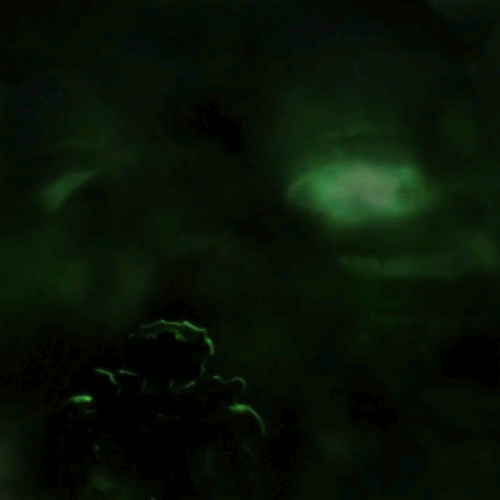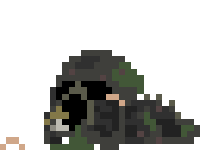
|
2014.11.08 the original makutaThis is adapted from posts I made in october and november of 2014. Its silly, because I wrote it in 2014. But its also the first time a lot of these thoughts got put down anywhere online, so I somewhat vainly like to think of it as 'important' in its own little way. Also my gf makes a cameo! So a while ago my girlfriend jessica put up this excellent blog entry about a tantalizing piece of dialogue that we got from Makuta and Takanuva in Mask of Light, that never really went anywhere. Makuta: Now, I will protect Mata Nui from you. |
|
It's a nice little piece of "what if" to consider, but ultimately the existence of the dialogue could be fairly well explained as another example of all of the weird nonsense that was going on at the end of Mask of Light. "We'll awaken Mata Nui, except we won't!" "All of the island's inhabitants must gather at the Kini-Nui and then come underground, except not really!" etc. Or at least, that's what I thought until Torsti put up the ISOs for the CDs in his BIONICLE Style Guide. There is an extremely interesting note made in the introduction: The Rahi are beasts influenced by the infected masks they wear; the Bohrok are carrying out a legitimate mission, and only lack of understanding of the part of others makes them seem bad. Even Makuta will eventually be shown to have good reasons for his seemingly nasty behavior... it is his methods that are at fault more than his motivation. Now, try to rectify that with the "bwahaha I will put Mata Nui to sleep and take over the world because I'm evil" Makuta we got. It's impossible. There is simply no way to cover both with one character. So I'm going to put forth a theory: it would seem that up to and through 2003, Makuta had a legitimate and potentially very interesting motivation for plaguing the islanders. By the point Legends of Metru Nui came out in 2004, the story team had rewritten him to be a more "kid-friendly" villain fitting into a black-and-white paradigm. A lot of what Makuta says in Mask of Light gets obfuscated by his demeanor. He has a deep, rumbling voice, an oily, patched-together appearance, and he hangs out in a cave filled with thick green smoke and pillars holding creatures in stasis. On top of it all, he is very clearly the designated villain in what is a kiddy, direct-to-video film made to sell toys. Literally everything sets our expectations to "he is a bad guy," and we don't question it. But look beyond this external layer, and we find something rather different through a few curious hints. It begins in Makuta's first appearance. Before he releases the Rahkshi, he contemplates, Must I release those who should never see the light of day? I'm not sure how to frame this in any way other than as remorse at the idea of what he is about to do. So what convinces him? I must preserve your slumber... It comes back to Mata Nui. Makuta will do whatever it takes to ensure his brother remains asleep. This isn't a ruthless, power-hungry villain bent on world domination - if that were the case, he would have no qualms with unleashing the Rahkshi. So the Rahkshi set out and start to terrorize the island, and Makuta sits back and observes. But something goes wrong - Kopaka manages to freeze the beasts within a lake, incapacitating them. Makuta can no longer rely on the fact that his sons will halt the coming of the seventh Toa, so he goes to plan B. Even though Takua himself doesn't know it yet, Makuta knows that the Matoran is right smack in the center of this matter. So he makes the chronicler an offer: If Takua stands down and gives Makuta the Avohkii so that Mata Nui can never be awakened, Makuta will leave the island alone. Takua's friends would be free from Makuta's grasp. Takua, like us viewers, doesn't think twice about calling bullshit on him. Yeah, right. If you give the McGuffin to the bad guy, he'll totally let you off scot-free. That's likely. But what happens after Takua departs, when Makuta is left to himself, with noone listening? What does he say? Oh... my good will refused... Unless Makuta is in the habit of lying through his teeth to himself for no reason, his offer was absolutely genuine. With his last resort, the Rahkshi, evidently unable to stand up to the Toa Nuva, his hand was forced and he tried the next best thing to victory: ensuring that his brother could, at least, remain asleep and be spared the pain of conciousness. But Takua has none of it, so Makuta does the next best thing: more Rahkshi. So by now, you may be asking: why? Why are all of these hints dropped in Mask of Light, of all places? What about the myriad of other story media leading up to it, why isn't it hinted at in any of it, too? For the answer, we have to dig a little into the past. If you are a longtime fan, then you might recall the earliest press releases for Mask of Light in 2002. They had familiar elements: two friends on a quest, the fate of the island at stake. But something else was mentioned in these synopses meant to strip the story to its absolute core: the island is crumbling into the ocean. Obviously, this plot element does not survive into the final film. And with good reason, because it ties into another major element of the film that was canned: the awakening of Mata Nui. Throughout the conclusion, wierd things keep happening. Everyone insists that they are descending into the Mangaia to awaken the Great Spirit, only for the matter to be forgotten once they literally do something that is supposed to awaken him. Takanuva instructs for all of the island's inhabitants to be gathered, and later brought underground, but we only get the Turaga (in the novelization, the island's population does in fact show up). This all makes sense only in the context of a film where Mata Nui does awaken; the islanders would need to be safely underground before Mata Nui could stand up and destroy the island. This explains the early island-crumbling plot. In the days before his awakening, Mata Nui is stirring, rocking the island and breaking chunks of it off. It might also explain a scene that does make it to the final film: Jaller and Takua's reuniting. Jaller ends up vulnerable thanks to an earthquake, which you don't really question until you look at is specifically. An earthquake? Natural disasters like that never happen on Mata Nui outside that instance. Its a really weird anomaly in the mythos that seems solely an excuse to have Jaller mistake Takua for an approaching Rahkshi. At least, until you consider that it may originally have been part of a very relevant, ongoing series of quakes on the island. That also explains Jaller's wry response to the event - earthquakes were common. Otherwise, he might have been expected to be more "wow! an earthquake!" like Vakama in the Kikanalo scene in LOMN. So that's why we get all of these hints dropped regarding Makuta's true nature. Originally, Mask of Light was the BIONICLE finale, and the climax was to be the revelation of Makuta's true nature. Eventually, Takanuva is born and travels to the Mangaia. Makuta's last ditch resort is to keep his cool and challenge Takanuva for his mask, as without the Toa of Light Mata Nui cannot be awakened. This, too fails, and we get to that all-important dialogue first highlighted by jessica. The exchange has a powerful effect on Takanuva. Suddenly, he is confident. He knows what to do. He and Makuta tumble into the protodermis and fuse into Takutanuva. Takutanuva isn't, in reality, all that important in the movie at first glance. He lifts the gate for everyone. But if, say, Makuta had been incapacitated, it seems entirely within reason that the Toa Nuva could've opened it themselves somehow. But in our supposed original intentions of the film, Takutanuva is all-important. He is the merged conciousness of Takanuva and Makuta. Suddenly, both understand each other, and they know what must be done to set things right. Cue the awakening of Mata Nui. Fin. But that leaves us to wonder what Makuta's original motivation was. We can understand why he is doing what he is doing at present: he believes that Mata Nui's reawakening will cause him pain, and so he does his best to prevent the people trying to awaken him from achieving their goal. But then why does he believe that Mata Nui's reawakening will be to his detriment? Why did he send the great spirit to sleep in the first place? PostscriptMany things have changed in the years since I wrote this. I had not noticed in 2014 that Faber had said "Takanuva had to merge with Makuta to defeat him. Light and darkness are connected and Makuta actually did god by securing that only the right heroes reentered the giant robot to restart it," which aligns closely with how I read Takutanuva. More recently, some storyboards appeared for sale on E-Bay with another telling piece of Makuta dialogue that was cut: "The Matoran have created many evil faces for me. These faces I must use against them." While this is a basic examination of Makuta in Mask of Light, my friend Mr. N's monumental work Makuta Evolution is, I would say, the definitive look at the character's secret history. The great Early & Unused Story Concepts in Bionicle, by my friend The Shadow Emperor, also looks at some of Makuta's different incarnations. |
|
